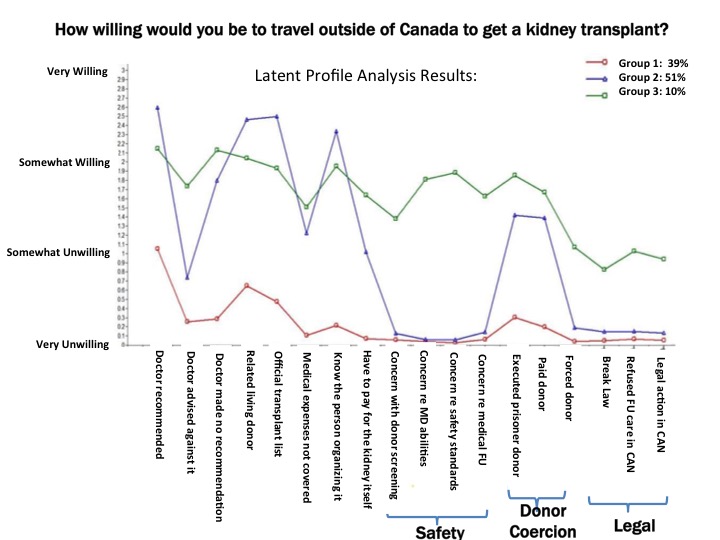Willingness of Canadian ESRD Patients to Consider Transplant Tourism.
UBC, Vancouver, Canada
Meeting: 2017 American Transplant Congress
Abstract number: D300
Keywords: Ethics, Kidney transplantation
Session Information
Session Name: Poster Session D: Non-Organ Specific: Economics, Public Policy, Allocation, Ethics
Session Type: Poster Session
Date: Tuesday, May 2, 2017
Session Time: 6:00pm-7:00pm
 Presentation Time: 6:00pm-7:00pm
Presentation Time: 6:00pm-7:00pm
Location: Hall D1
Background
Transplant tourism refers to travel for transplantation involving organ trafficking or transplant commercialism, and is associated with poor outcomes. While some characteristics of transplant tourists have been described, there are no data on ESRD patients who may be at high risk for engaging in this practice.
Methods
We surveyed 592 Stage V chronic kidney disease (CKD) and dialysis patients in Vancouver, Canada to determine their willingness to travel outside of Canada and purchase a kidney.
Results
58% of surveyed patients (n=342) were willing to travel for transplantation, with 149 (25%) strongly willing to travel. The willingness of patients to travel for transplantation was examined under different circumstances. Notably, 24% (n=143) were willing to pay for a kidney on top of paying the medical costs of the transplant and 33% were willing to travel even if they knew the donor was an executed prisoner, but only 4% admitted they were willing to break the law to obtain a transplant overseas. Those willing to travel and purchase a kidney were younger, male, had higher median household income, and were less knowledgeable about the risks and legality of transplant tourism (p<0.05 for all comparisons).
A latent profile analysis was performed to group patients based on the pattern of their responses to a series of scenarios that may impact their willingness to travel for transplantation. Fig 1 outlines the pattern of responses in 3 distinct groups: 10% of patients were willing to travel to obtain a transplant irrespective of concerns about their safety, donor coercion, or legality, while 39% were unwilling to travel under any circumstance. Fifty-one percent of patients expressed a high willingness to travel, but were unwilling if there was concern about their safety or if there were legal consequences.  Conclusion
Conclusion
Nearly a quarter of Canadian ESRD patients surveyed were willing to purchase a kidney outside of Canada and may be at high risk for engaging in transplant tourism. The majority of patients were less willing to travel when presented with safety or legal concerns, suggesting that education of at-risk patients may be effective at preventing transplant tourism.
CITATION INFORMATION: Gill J, Gill G, Joffres Y, Rose C, Gill J, Russell L, Levin A, Richardson C. Willingness of Canadian ESRD Patients to Consider Transplant Tourism. Am J Transplant. 2017;17 (suppl 3).
To cite this abstract in AMA style:
Gill J, Gill G, Joffres Y, Rose C, Gill J, Russell L, Levin A, Richardson C. Willingness of Canadian ESRD Patients to Consider Transplant Tourism. [abstract]. Am J Transplant. 2017; 17 (suppl 3). https://atcmeetingabstracts.com/abstract/willingness-of-canadian-esrd-patients-to-consider-transplant-tourism/. Accessed February 7, 2026.« Back to 2017 American Transplant Congress
